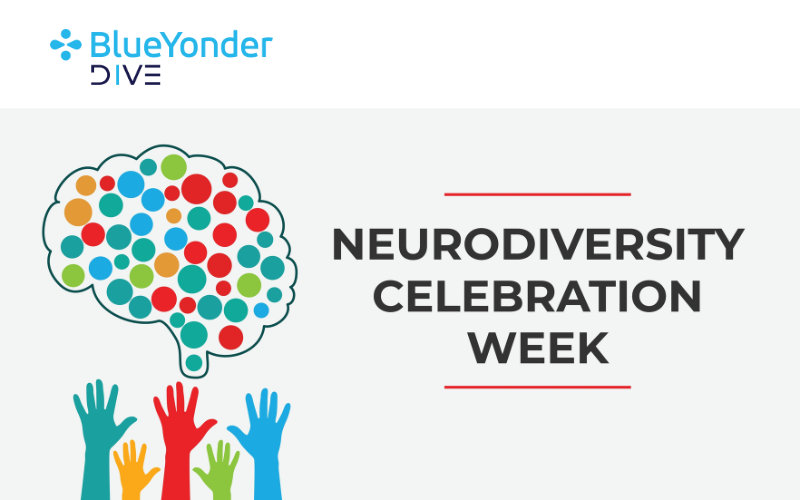Blue Yonder Associates Share Their Experiences for Neurodiversity Celebration Week
March 18-24 is Neurodiversity Celebration Week, a worldwide initiative that challenges stereotypes and misconceptions about neurological differences. Neurodiversity is an umbrella term used to describe alternative thinking styles such as Dyslexia, DCD (Dyspraxia), Dyscalculia, OCD (Obsessive Compulsive Disorder), Autism, and ADHD. It is thought that 15-20% of the world’s population is neurodiverse. Blue Yonder associates shared their stories and experiences being neurodivergent in the hopes of helping to create more inclusive and equitable cultures.
Anonymous:
As a manager with ADHD, I have learned to use my unique strengths to my advantage, such as my ability to focus intensely on tasks and consider all possible scenarios. I have also developed strategies to stay organized and on top of tasks, such as completing easier tasks right away and saving more difficult tasks for when I have a rush of hyperfocus. Being diagnosed with ADHD has helped me understand and manage my behaviors, and I am open to learning and trying new things.
My tip for everyone is to embrace your strengths and challenges, whether related to ADHD or not. By acknowledging and accepting them, you can develop strategies to work with them and communicate effectively with others. It’s also important to be open to learning and trying new things, as everyone’s experiences and needs are different.
Learn more about ADD/ADHD: https://chadd.org
Anonymous:
OCD (Obsessive Compulsive Disorder) is something I live with daily. It’s not just one aspect of my life, it affects everything – my relationships, how I work, and what I do. My brain is different from an atypical brain. We all have intrusive thoughts, but where your brain may have the thought and then it exits, my OCD grabs hold of that thought and makes it feel very real and scary. It then seeks reassurance and wants to question what I’m doing until it gets the reassurance, which can end in a compulsion. What this looks like is so varied across anyone with OCD; OCD is vast and although some of the mechanics of it are consistent, what drives it and how it manifests look different from person to person. Although someone without OCD will never truly understand how it works, they can be empathetic and realize that it’s not the person, but it’s their OCD. The OCD that is the unwanted party guest making them question things in their head. But I am still here, I have so much value to offer, and I put the work in to manage it. I feel like a more creative and empathetic person because of it.
The bias is real. Although the conversation around mental health has increased in society over recent years, the fear of saying I have OCD and how I will be perceived, especially the assumptions people will make, is a real risk to me. I don’t talk about it openly outside my family and close friends.
We need to be thoughtful of how we communicate. We likely all have said at one point or heard someone else say, “Oh, that’s just my OCD,” which is usually related to being organized or clean – and that is not what OCD is. Consider your choice of words and how the person you are speaking to may just have one of those diagnoses and feel dismissed and hurt inside. Please don’t use OCD or other diagnoses as a flippant comment or descriptor. It is harmful for those of us living with it every day.
To learn more about OCD: https://iocdf.org/about-ocd/
Monica Medina:
When I was a child, I was diagnosed with ADHD. My parents did not know at that time what it was, but the specialist reassured them by saying that I simply had a difference at the brain level. They did their best to help me focus and put routines into place so I wouldn’t get distracted, or get lost in what I was working on. At the same time, they let me be adventurous. Now as an adult, I am able to use the skills they taught me to thrive. Although some tasks take me longer than others, this does not stop me from being who I am and what I want to be. Unfortunately, if a child has ADHD, even today they are still very stereotyped that they will be a failure in life or too rebellious, etc. Those of us with ADHD like to be challenged so we can be better. And like everyone, we do also need limits. I am grateful to my parents for the skills they taught me. We are different, we learn differently, but who doesn’t? We just have to be able to understand, be empathetic and help each other. And above all, never judge others simply because they are not like us.
Anonymous:
Neurodiversity is not a stigma, it is a different way of experiencing and interacting with the world around you. Unique perspectives, greater innovation, and better problem solving are just a few examples of what neurodiverse people can bring to the workplace.

